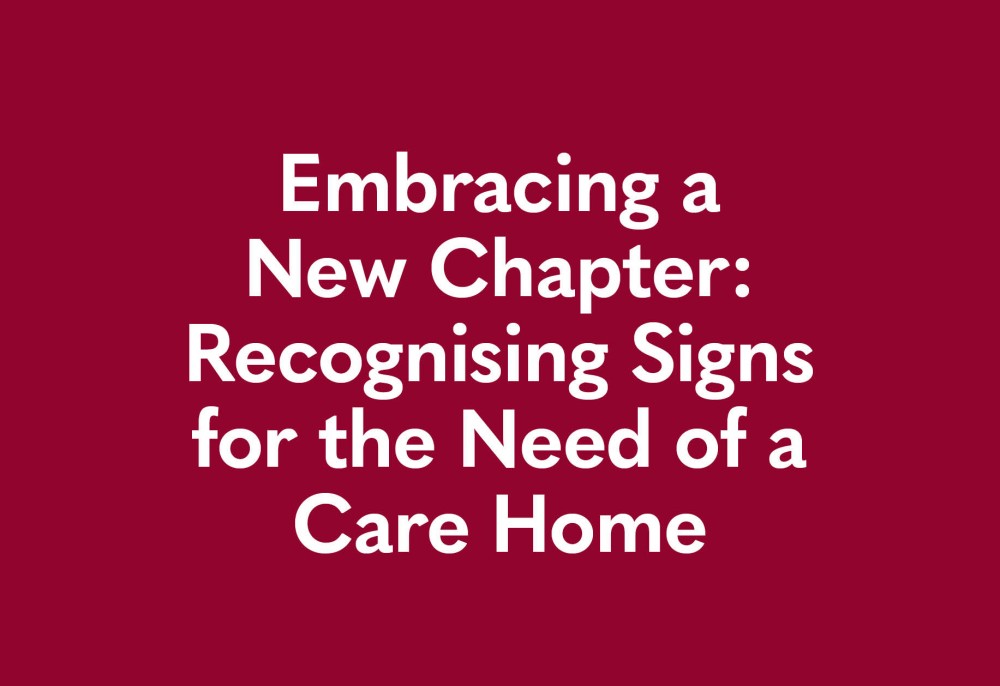
When should you consider a care home for your loved one?
As your loved ones age, staying aware of and coordinated with their evolving needs is essential to ensure their safety, well-being, and happiness. Sometimes, you might begin to notice that living independently may no longer be the best or safest option.
Assessing the need for long-term care
Whether it’s your parent, spouse, or friend you’re worried about, you might find that you’re asking yourself ‘How do I know when my loved one needs a care home?’ You might also be wondering how to ensure that moving to a care home is a positive experience.
In this article, we'll explore these signs it might be time for assisted living with a positive and compassionate perspective, recognising the opportunity for enhanced care and support in a residential setting.
You can download our guide: The 10 steps to find the right care home for you, here.
Indicators for assisted living
Falls or physical injuries
Living independently in our older years can create challenges, especially when simple tasks like cooking or cleaning become potentially dangerous.
Uneven floors and stairs may increase the risk of falls, emphasising the importance of a safer and more supportive environment. Transitioning to a care home ensures that expert supervision is readily available, offering safety and comfort.
It's all about embracing a safer environment!
Changes in mobility
Noticeable changes in mobility can be distressing for our loved ones. Pain while moving around, difficulty getting out of bed, or the reliance on assistive devices like canes or walkers can be strong indicators that they would benefit from the support provided in a care home.
At St Martins Care they can receive the support they deserve and the assistance they need to move comfortably and maintain their independence as much as possible.
Forgetfulness
As our loved ones age, it's natural for mental capacity to change. If you see an increase in forgetfulness or confusion about simple things, it's a sign that additional support may be necessary, which care homes like St Martins Care can provide.
Our care home environment at St Martins Care nurtures provides specialised care and attention to address cognitive needs, encouraging mental well-being and engagement.
Changes in eating habits
Monitoring eating habits is crucial in determining if your loved one receives the nutrition they need. A reliance on microwavable meals or takeaways may signal a challenge in preparing healthy meals independently. Observing their ability to cook and ensuring they eat enough throughout the day are vital considerations.
At St Martins Care our residents benefit from nutritious, well-balanced meals prepared with their dietary needs in mind, with the excitement of a new menu every week.
Reduced social interaction
Becoming withdrawn or showing a lack of interest in social situations can indicate various concerns, from cognitive decline to worsening physical conditions or even depression which are all big signs the sufferer of these traits may need a care home.
Recognising these signs early allows for timely intervention and support. Here at St Martins Care, our residents have the opportunity to engage in social activities regularly, fostering connections with peers and promoting a sense of community. You can see our residents enjoying our activities here.
Determining the right time for a care home
In the context of ageing, or living with an illness like dementia, the decision to move to an assisted living facility isn't determined by a specific age or duration of time of living with the illness.
Instead, it revolves around identifying what is most beneficial for each individual based on their distinct circumstances and unique traits. The right time is the time that is right for you.
Embracing the decision to transition to a care home is not about limitations, it's about acting on the signs you notice and taking a positive step towards providing the support, safety, and care our loved ones deserve.
Recognising these signs allows us to make informed decisions that prioritise their well-being, ensuring they embark on a new chapter with comfort, dignity, and a sense of community.
Contact us today
If you have any concerns, queries, or would just like some more information, don’t hesitate to get in touch.
February 9, 2024
Information
Want to know more about our care homes and the care we offer?
Go to our homes